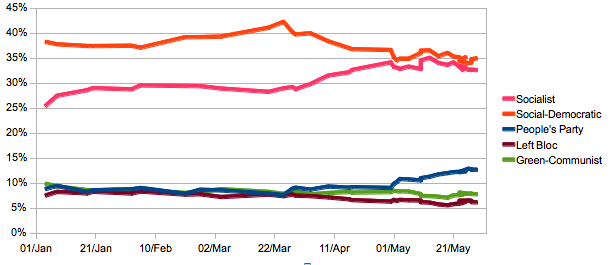 |
| The Socialist party, whose logo looks like it belongs on a newpspaper handed out on the street |
Jose Socrates: "Guys, I know this budget is going to be unpopular, but we need to pass it or we're going to be forced to take an EU bailout to make the rent, and their money comes with a hell of a lot of strings attached. Plus, if it doesn't pass, I'm basically not going to be able to do my job."
Passos Coelho: "Sorry old fruit, but we reckon we'd have you on toast in a general election, so put up them dukes and get ready for a vote of No Confidence".
So step forward the PSD, main opposition and government in waiting, right?
 |
| The Social Democratic party, whose logo looks like a removal company from 1990 |
Well, maybe. Here's a smoothed chart of opinion polls:
Just before the election was called, there was a widespread perception that the Socialists had fallen asleep at the wheel and the PSD should be next to have a go. Since the actual campaign started, they seem to have been bleeding out.
One reason might be that the vote of No Confidence was seen as a bit mercenary; the PSD have a long history of preferring smaller government and voting for austere budgets. The political spectrum in Portugal is similar to ours here in the UK, but the divisions are different. Probably the best description of the PSD is that they are like our Coalition government: a big tent including Big Society conservatives and free-market Liberals. The difference is that while our Right-leaning Lib Dems said that they might not be getting everything they want, but the middle of a debt crisis was no time to monkey around with minority governments and early elections. The PSD, in the eyes of their critics, said that they might well be getting everything they want but there were political gains to be had, so the unsteady nerves of the market could go hang while they cashed in.
Another explanation is that steadily-rising Blue line. Attentive readers might be thinking that if the PSD are the Coalition, then there's room on the right flank: people who refer to themselves as Tories, the Carlton Club and Cornerstone Group. In Portugal, that's the People's Party.
 |
| The People's Party, whose logo looks like a symbolic instruction on a health and safety panel of a box of industrial cleaning powder. |
Since Portugal has proportional representation, Parliament will probably end up looking a lot like the polls. If it stays as it is, the question will be: who is better placed to pull together a coalition or govern as a minority?
 |
| Passos Coelho - Image from the Lagos branch of the PSD |
 |
| Jose Socrates- image by Francisco Leong/ AFP |
It look to me like it'll be a nailbiter.

No comments:
Post a Comment